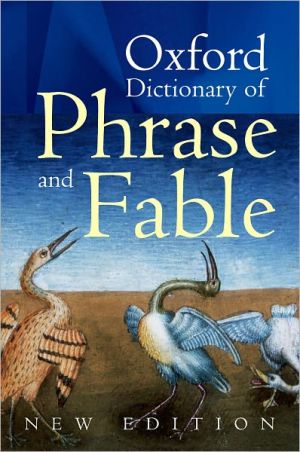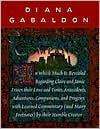Oxford Dictionary of Phrase and Fable
Here is a wealth of background information on common phrases and allusions, encompassing everything from "rebel without a cause" and "Marlboro Man" to "The Twelve Labors of Hercules." \ Drawing on Oxford's unrivalled bank of language and quotation on-line resources, this highly browsable potpourri of allusive terms includes entries from a broad range of topics, including classical mythology, history, religion, folk customs, superstitions, science and technology, philosophy, and popular...
Search in google:
Here is a wealth of background information on common phrases and allusions, encompassing everything from "rebel without a cause" and "Marlboro Man" to "The Twelve Labors of Hercules." Drawing on Oxford's unrivalled bank of language and quotation on-line resources, this highly browsable potpourri of allusive terms includes entries from a broad range of topics, including classical mythology, history, religion, folk customs, superstitions, science and technology, philosophy, and popular culture. Unlike the major competing volume, the Dictionary contains more entries, with a wider range of reference and more lucid explanations. Indeed, the 20,000 entries are rich with information, going beyond a simple identification to include colorful details, such as word origins and illustrative quotations. We learn, for instance, not only that "The Land of the Rising Sun" refers to Japan, but also that the phrase is a translation of Japanese Nippon (nichi "the sun" and pon "the source"). We also learn that "Leatherneck" refers to the leather lining inside the collar of a marine's uniform. There are special boxes for topics such as Days of the Week and Last Words (from Goethe's "More light" to Robert E. Lee's "Strike the tent"). The volume also features thousands of brief biographies, both real and fictional, from Old Mother Hubbard to Gypsy Rose Lee, and a thematic index for easy use. And there are numerous cross-references throughout the book. From "Barbie Doll" to "the Big Bang Theory," "Every Dog has His Day," and "Seven-League Boots," The Oxford Dictionary of Phrase and Fable is a kaleidoscopic reference work on the thousands of colorful words and phrases we use every day. About the Author: Elizabeth Knowles is Managing Editor of the Oxford Quotations Dictionaries. She is also the editor of The Oxford Dictionary of Quotations and The Oxford Dictionary of New Words, among other works.Library JournalThis revised and updated resource maintains the 2000 original edition's chief strengths: the coverage of a huge variety of terms and Oxford's deep etymological scholarship. Editor and historical lexicographer Knowles (publishing manager, Oxford Quotations Dictionaries) and his staff incorporate two main changes: first, new entries such as "9/11," "Sunni Triangle," and "elephant in the room," as well as entries emphasizing figurative language from literary sources, e.g., "price of admiralty," and second, a streamlined presentation through the removal of usage quotations, 50 boxed, and some biographical entries. These changes keep this A-to-Z resource in a unique place between traditional etymology dictionary and one-volume encyclopedia. The entry for "Basque," for example, adds the French background for the name. Similarly, the definition for "Camp David" identifies "David" as President Eisenhower's grandson. Most definitions are a few sentences long and include no pronunciation guide, grammatical discussion, or suggestions for further reading. Despite the title, nonliterary phrases like the nicknames for each U.S. state, many theological terms, and some scientific terms are also included. Bottom Line Oxford's broad scope reflects its competition with publishers of the well-known Brewer's Dictionary of Phrase and Fable, last published in the United Kingdom in its 17th edition by Orion in 2005. The strength of Oxford's resource remains the etymology incorporated into the entries. Recommended for public and academic libraries, particularly those that did not purchase the first edition.-Marianne Orme, Des Plaines P.L., IL Copyright 2006 Reed Business Information.
Examples of headwords are:
\ Library JournalThis revised and updated resource maintains the 2000 original edition's chief strengths: the coverage of a huge variety of terms and Oxford's deep etymological scholarship. Editor and historical lexicographer Knowles (publishing manager, Oxford Quotations Dictionaries) and his staff incorporate two main changes: first, new entries such as "9/11," "Sunni Triangle," and "elephant in the room," as well as entries emphasizing figurative language from literary sources, e.g., "price of admiralty," and second, a streamlined presentation through the removal of usage quotations, 50 boxed, and some biographical entries. These changes keep this A-to-Z resource in a unique place between traditional etymology dictionary and one-volume encyclopedia. The entry for "Basque," for example, adds the French background for the name. Similarly, the definition for "Camp David" identifies "David" as President Eisenhower's grandson. Most definitions are a few sentences long and include no pronunciation guide, grammatical discussion, or suggestions for further reading. Despite the title, nonliterary phrases like the nicknames for each U.S. state, many theological terms, and some scientific terms are also included. Bottom Line Oxford's broad scope reflects its competition with publishers of the well-known Brewer's Dictionary of Phrase and Fable, last published in the United Kingdom in its 17th edition by Orion in 2005. The strength of Oxford's resource remains the etymology incorporated into the entries. Recommended for public and academic libraries, particularly those that did not purchase the first edition.-Marianne Orme, Des Plaines P.L., IL Copyright 2006 Reed Business Information.\ \ \ \ \ BooknewsOxford offers its competition to Brewer's, one of the great, but lesser-known reference books. The Oxford boasts 20,000 cross- referenced entries covering phrase, fable, and famous figures and places. Entries are international in scope from , a Hindu ceremonial procession to , a type of Swiss Alpine melody, to , a country described by the ancient Greek explorer Pytheas. An interesting feature is an index of special lists that include the apostles of different countries, Henry VIII's queens, Jewish calendar months, plagues of Egypt, and an interesting idea, the last words of famous people, such as Oscar Wilde's: "One of us must go." Lacks pronunciation of entries. Annotation c. Book News, Inc., Portland, OR (booknews.com)\ \








